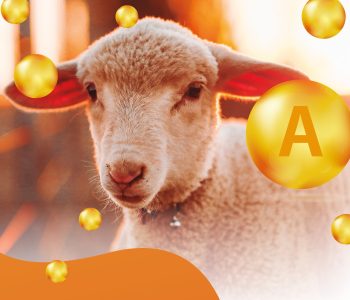Influence of Antioxidants and Vitamin A in Sheep Production
Efficient nutrition in sheep is crucial for the success of meat, milk, and wool production. Among the various factors that impact this process, there arises the need to utilize tools for its optimization.
When this occurs in the body, cells are directly harmed, for example, through DNA fragmentation and loss of plasma membrane integrity.
These damages have been related to low productive performance.
As this oxidative stress can compromise cell integrity, the use of tools that can act as a protective shield, reducing cellular damage and maintaining metabolic viability, is essential.
Antioxidants are substances that have the ability to protect cells against the effects of free radicals produced by the body. They can also promote increased immunity and disease prevention.
Vitamin A, known as the “epithelial vitamin” or retinol, is indispensable for sheep, as it acts in the formation and maintenance of skin and mucous membrane integrity, including conjunctival, bronchial, vesical, and uterine mucosa.
It aids in the production of visual pigments and the metabolism of light-receptive cells in the retina, which is directly linked to photoperiod and reproduction in female sheep.
It contributes to spermatogenesis, helps maintain skeletal tissue, and contributes to bone development.
When this occurs, clinical signs such as diarrhea, nasal discharge, excessive tearing, and even motor coordination issues are common.
| β-carotene is considered a provitamin and undergoes chemical changes in the intestinal mucosa, where it is absorbed along with lipids, in the form of vitamin A. |
Its potential transformative value is quite significant, as ruminants have an average conversion capacity of 24% (1 mg of β-carotene is equivalent to 400 IU of vitamin A).
Studies indicate that adequate supplementation of this vitamin can improve seminal quality in sheep. This directly impacts the viability of frozen semen, which requires greater protective support.
Additionally, it also protects udder health, reducing the incidence of mastitis and increasing the recovery rate of affected animals.
Ensuring adequate supplementation of vitamin A in the sheep diet is essential to provide higher production rates and lower expenses on therapeutic treatments.
Foods rich in vitamin A, such as fresh pastures, can be combined with specific supplements. In confined animals, vitamin A is not stored in appreciable amounts in the body due to the fact that animals have high quantities of concentrated and preserved foods in their diet, which are poor in this substance.
Furthermore, in confinement, sheep have faster growth, requiring more attention to supplementation in these cases.
The recommended dosage varies according to the reproductive phase and individual conditions of the herd.
In male breeders, the following signs can be seen:
• Decreased sexual activity
• Low sperm motility
• Inhibition of spermatogenesis
• Testicular atrophy
•Decline in steroidogenesis
With a balanced approach focused on reproductive health, vitamin A proves to be a valuable ally in sheep production.
Bibliographical references available upon request. [/register]
You may also like to read: “Vitamins for Swine Health, Welfare, and Productivity”
